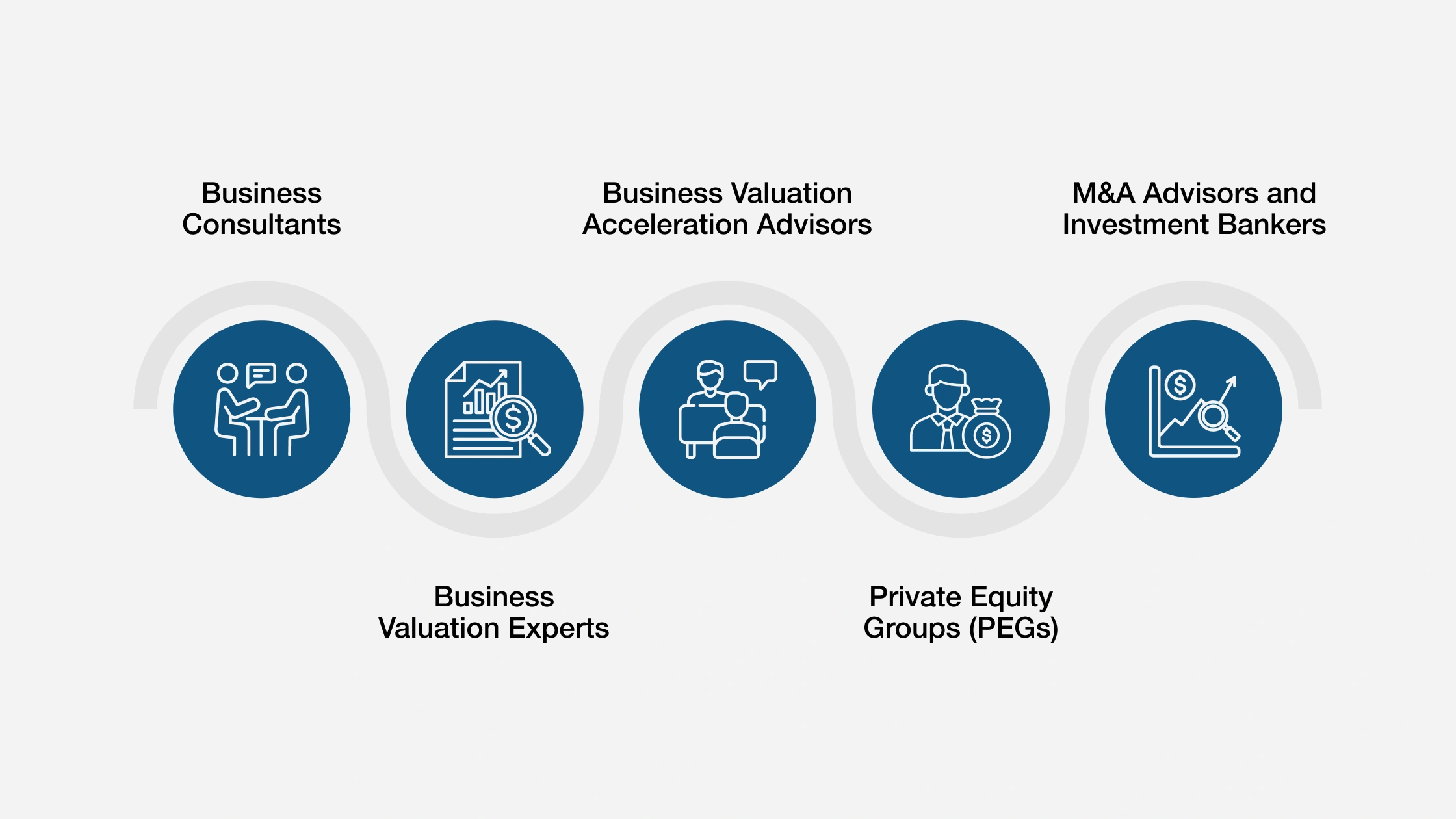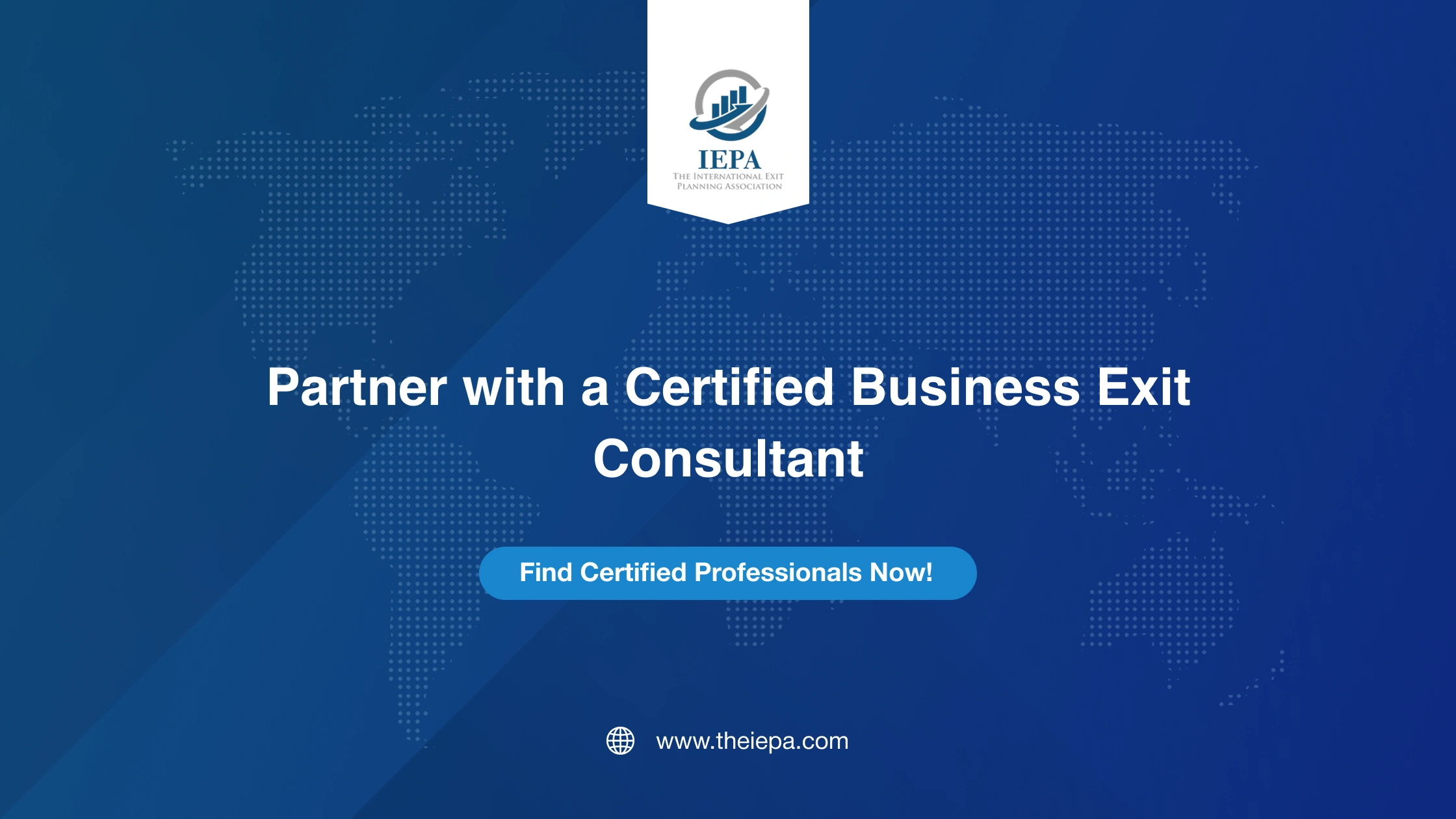Business consultants, business valuation experts, business value acceleration advisors, private equity groups (PEGs), and M&A advisors all contribute to enhancing business value. Still, they approach value acceleration from different perspectives, timeframes, and end goals.
Here’s a comparison of each advisor, along with an illustration of how these experts can collaborate to support a successful business exit.
Five Advisor Moves That Drive Value

Each type of advisor plays a distinct role in driving value creation. Together, they offer business owners a roadmap to strengthen performance and prepare for exit.
1. Business Consultants
A consultant is an advisor who solves problems others haven’t been able to solve, and can wear many hats – including coach, mentor, trainer, implementer, auditor, or analyst. The primary objective of a business consultant is to improve a company’s operational performance and strategic positioning in the marketplace. Due to the scope and breadth of their experience working with businesses, business consultants can quickly resolve complex business problems and introduce industry best practices, leading to transformational change.
Business consultants approach business value acceleration by:
- Focusing on internal optimization in the areas of leadership, management, operations, strategy, product/service offerings, sales, marketing, finance, HR, and technology. This focus involves working onsite with the client over an extended period and conducting a “deep dive” to identify the root cause(s) and implement the right solutions to complex business problems.
- Conducting diagnostics and gap analyses to identify inefficiencies and benchmarks for improvement.
- Recommending and implementing process improvements, cost reductions, productivity enhancements, resource reallocations, performance-based incentives, management & leadership training, and growth strategies.
Business consultants establish key performance indicators to build sustainable enterprise value through better operations and competitiveness.
Their recommendations can result in noticeable improvements in the short-, intermediate-, and long-term value of the business, while also positioning the business well for future growth or sale.
2. Business Valuation Experts
Business valuation advisors provide an accurate, objective assessment of a company’s value. These advisors analyze financial statements and use economic models, including discounted cash flows (DCF,) comparables, and precedent transactions, and assess factors like cash flow, risk, industry trends, and market positioning.
Business valuation experts don’t directly improve value but can play an important role in identifying value drivers and risks, and their analysis can help a business focus on KPIs, like recurring revenue, EBITDA margins, customer concentration, and other factors that impact valuation.
3. Business Valuation Acceleration Advisors
Business value acceleration advisors focus on key value drivers to enhance business value by helping owners, executives, and teams improve the business’s transferability, readiness, and attractiveness to a buyer. They align strategy with exit and growth goals, help “de-risk” the business, prepare for due diligence, and increase market attractiveness. However, some may adopt a “one-size-fits-all” or “cookie-cutter” approach, and internal weaknesses beyond their level of expertise may linger.
While acutely focused on exit preparation (as with all advisors), references, and business, industry, succession, and exit experience are all critical considerations.
4. Private Equity Groups (PEGs)
Private Equity Groups (PEGs) build business value using ambitious growth plans that have a synergistic impact on business value and decisive exit strategies. PEGs buy a controlling interest in a company and then inject capital, operational expertise, and strategic oversight to drive significant growth, margin improvement, and/or restructuring.
Often, their approach includes bringing in professional management and established governance structures. The management team implements value creation initiatives, such as diversification into new markets, bolt-on acquisitions, and financial reengineering.
PEGs have a 3-to-7-year investment horizon and may exit by identifying a strategic buyer, IPO, or recapitalization. Because PEGs usually target sizable and/or fast-growing businesses with high margins, it might not be an option for all businesses.
5. M&A Advisors and Investment Bankers
M&A Advisors and Investment Bankers position a business for sale at the highest valuation. They conduct buyer research, marketing, and negotiations, and advise companies on deal structure, pricing, and timing to complete a sale, merger, or strategic acquisition.
These advisors typically do not fundamentally change the business. Still, they may advise on pre-sale improvements to enhance attractiveness, such as streamlining financials or facilitating leadership transitions to maximize market value through strategic packaging and competitive bidding. Like PEGs, M&A Advisors, and investment bankers, these types of businesses target those best suited for this type of exit, so it’s not for everyone.
Summary Table:
| Advisor | Focus | Time Frame | Hands-On Approach | Value Impact |
| Business Consultant | Strategic and Operational Improvement. | Short-, Intermediate-, and Long-Term. | Yes. | Increases Intrinsic Value. |
| Business Valuation Advisor | Objective Business Value Assessment. | Point-In-Time, or Periodic. | No. | Identifies Value Drivers & Risks. |
| Business Value Acceleration Advisor | Business Readiness, Attractiveness, Value, and Transferability. | Intermediate- to Long-Term. | Limited. | Identifies Value Drivers & Risks + Offers Solutions. |
| Private Equity Group | Growth & ROI Through Ownership. | 3-to-7 Years. | Very. | Drives Rapid Value Creation. |
| M&A Advisor & Investment Bankers | Sale/Acquisition Facilitation. | Short- to Intermediate– Term. | Somewhat. | Maximizes Exit Value. |
To illustrate how these advisors might work together to assist a business preparing for exit in three (3) years, consider the following example involving a business consultant, business valuation expert, private equity group, and M&A advisor:
Scenario – Mid-Sized Manufacturer Preparing for Sale
Suppose a mid-sized manufacturer generating $25 million in revenues and $3 million in EBITDA wants to increase its value and prepare for sale in three (3) years.
Let’s further assume that this business is facing the following challenges:
- Inconsistent margins due to operational inefficiencies;
- A heavy reliance on a few key customers;
- Outdated equipment and limited digital systems;
- No formal strategic plan or succession plan; and
- Financials that are accurate, but not “investor-ready.”
In this illustration, this company might first turn to a business consultant to improve its’ internal performance and strategic position in the marketplace with a scope of work that includes:
- Conducting an operational audit and a possible lean manufacturing process implementation;
- Optimizing the business’ supply chain and reducing waste;
- Installing an ERP system for better data control;
- Building KPIs and real-time dashboards for sales mix & margin monitoring; and
- Creating a strategic growth roadmap with project measurables that include (i) EBITDA improvement, (ii) stronger systems, procedures & controls, (iii) a focus on customer diversification, and (iv) lower perceived risk.
At the end of year two, the company might next hire a business valuation expert to provide a benchmark valuation and identify key drivers. The scope of the business valuation expert is to perform a formal valuation annually to track progress, help isolate value drivers, including recurring revenue and asset utilization, and identify valuation discount factors to focus on, like customer concentration and key-person risk.
In other words, the business valuation expert’s role is to keep the company focused on activities that drive valuation multiples.
At this stage in the process, the company may consider involving a private equity group, an M&A firm, or an investment banker. If the strategy were to sell a majority stake and exit later, a private equity group could:
- inject growth capital to expand the business,
- professionalize the management team,
- target an aggressive margin, and
- implement a revenue growth strategy and exit plan involving a secondary sale in three to five years.
The tradeoff would be that while the business would likely increase significantly in value, the business owner would have a minority stake in the company and lose control.
If the company decided to then use an M&A advisor or an investment banker to market and sell the business at the highest price, this advisor would:
- Conduct buyer research;
- Prepare a Confidential Information Memorandum;
- Normalize EBITDA – using addbacks and adjustments;
- Create competitive bidding to drive valuation; and
- Structure a deal for tax and strategic benefit.
The M&A advisor would be engaged for the next 6–to-12 12-month period to plan the sale to a strategic buyer with the objectives of maximizing market value and ensuring a smooth deal execution.
How Business Experts Fit Together Over Time to Ensure Maximum Value Creation
| Role | Year 1 | Year 2 | Year 3 |
| The Consultant’s Focus | Improves Operations | Executes Growth Strategies | Fine-Tunes Systems, Procedures & Controls |
| The Valuation Advisor’s Focus | Establishes A Baseline Business Valuation | Tracks Gains | Completes Periodic & Final Business Valuation |
| The PEG’s Focus | Invests Capital + Assumes Controlling Interest | Drives Growth | Prepares for Exit |
| The M&A Advisor’s Focus | Engages & Sells The Business at the Highest Possible Valuation |
In summary, business owners can maximize the value of their business and exit by:
- Using consultants early to fix internal inefficiencies and maximize business performance;
- Hiring a business valuation advisor to establish a value for the business and periodically track how changes affect enterprise value;
- Employing a business value acceleration advisor, CPA, attorney, et. al. to ensure the business is “attractive,” “ready,” “valuable,” and “transferable” to a buyer;
- Bringing in a PE firm if the business owner wants outside capital and expertise to grow quickly, and is comfortable giving up equity and control; and/or
- Engaging with an M&A advisor close to the exit to optimize the presentation, marketing, and negotiation of the sale.
Each advisor brings unique training and experience to position a business for exit.
Partner with a Certified Business Exit Consultant
A Certified Business Exit Consultant CBEC® can help guide a business owner through this process, create a comprehensive exit plan, and help the business assemble a team of advisors with the best qualifications to position that business for maximum value and an efficient succession consistent with the business owner’s goals and objectives for exit.
Find Certified Professionals Now!
About the Author:
James J. Talerico, Jr. CMC ® CBEC ® is an award-winning author, blogger, speaker, and a nationally recognized small to mid-sized (SMB) business expert, with outstanding business consulting, succession planning, value acceleration, and exit planning credentials. He is the owner of Greater Prairie Business Consulting, Inc. (www.greaterprairiebusinessconsulting.com) located in Irving, Texas and has helped thousands of business owners throughout the US and in Canada maximize their business performance and exits for more than 30 years. Jim currently sits on The IEPA’s Education Committee.





